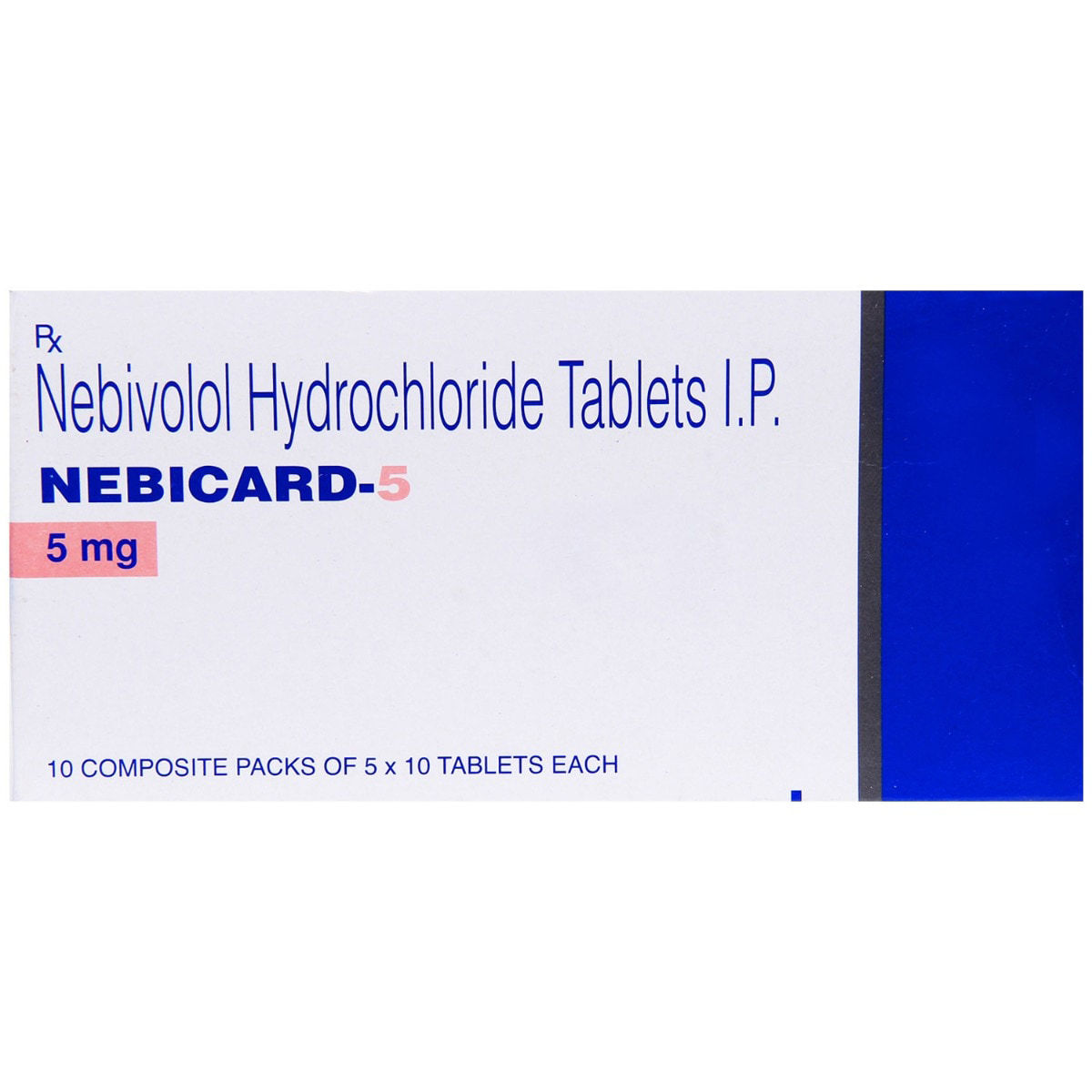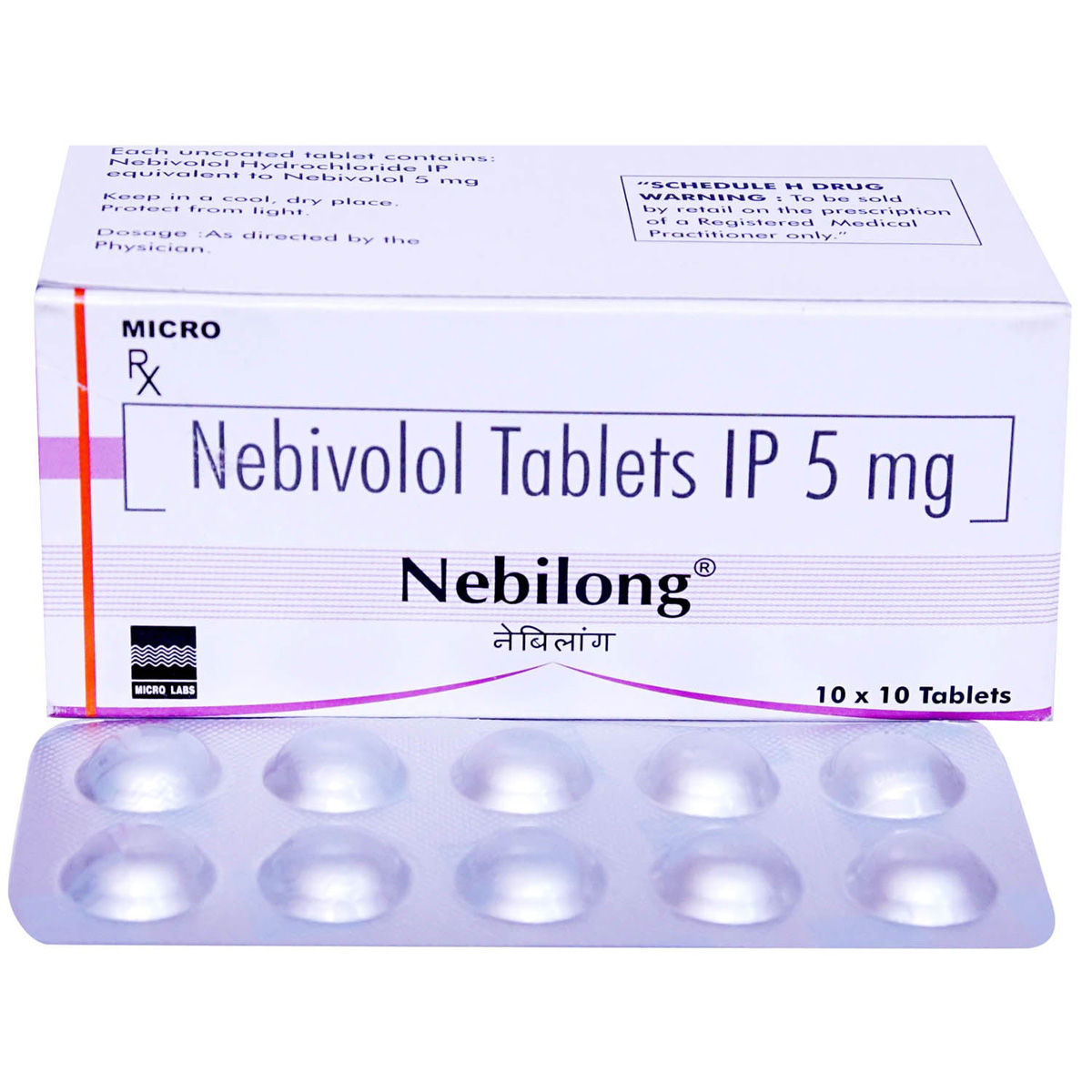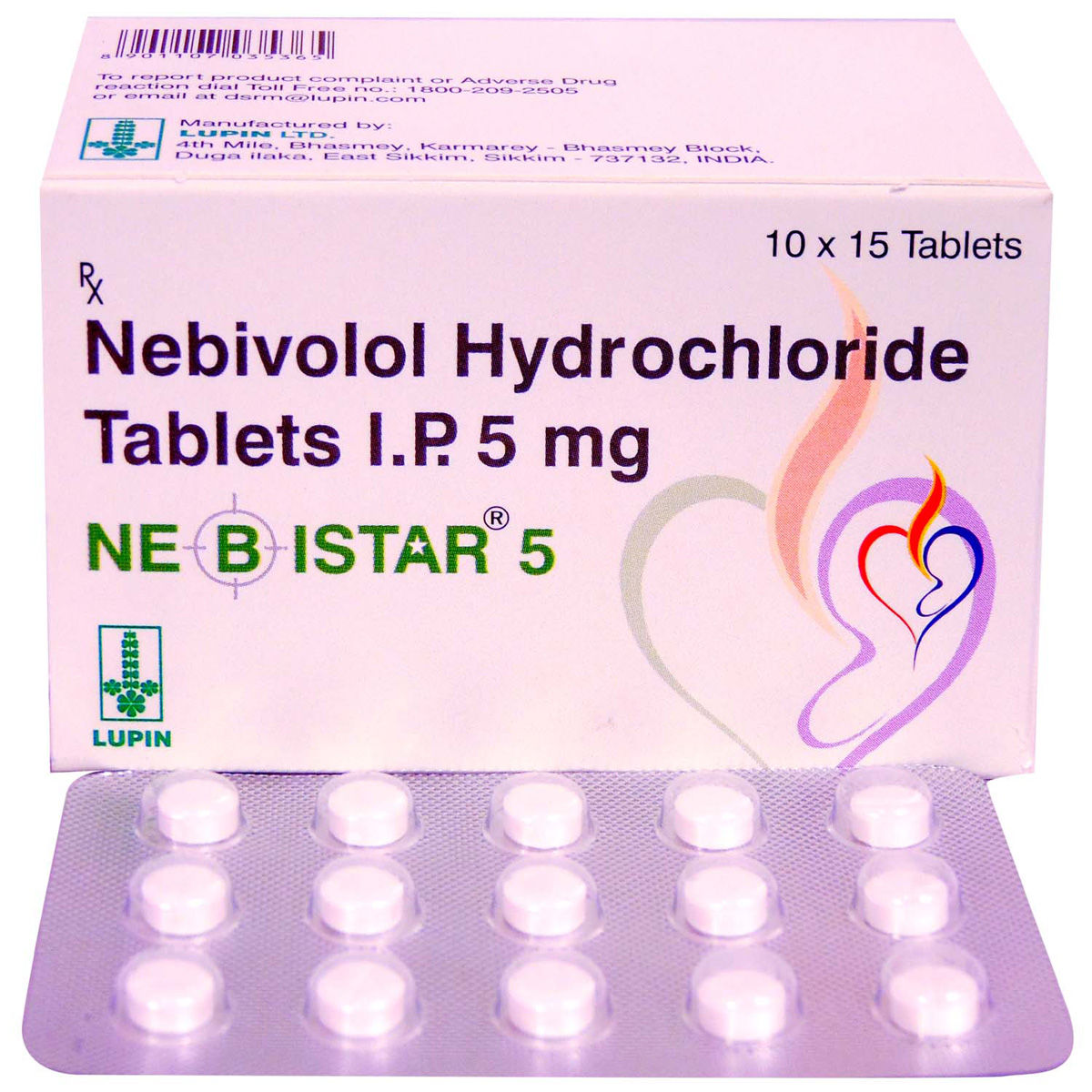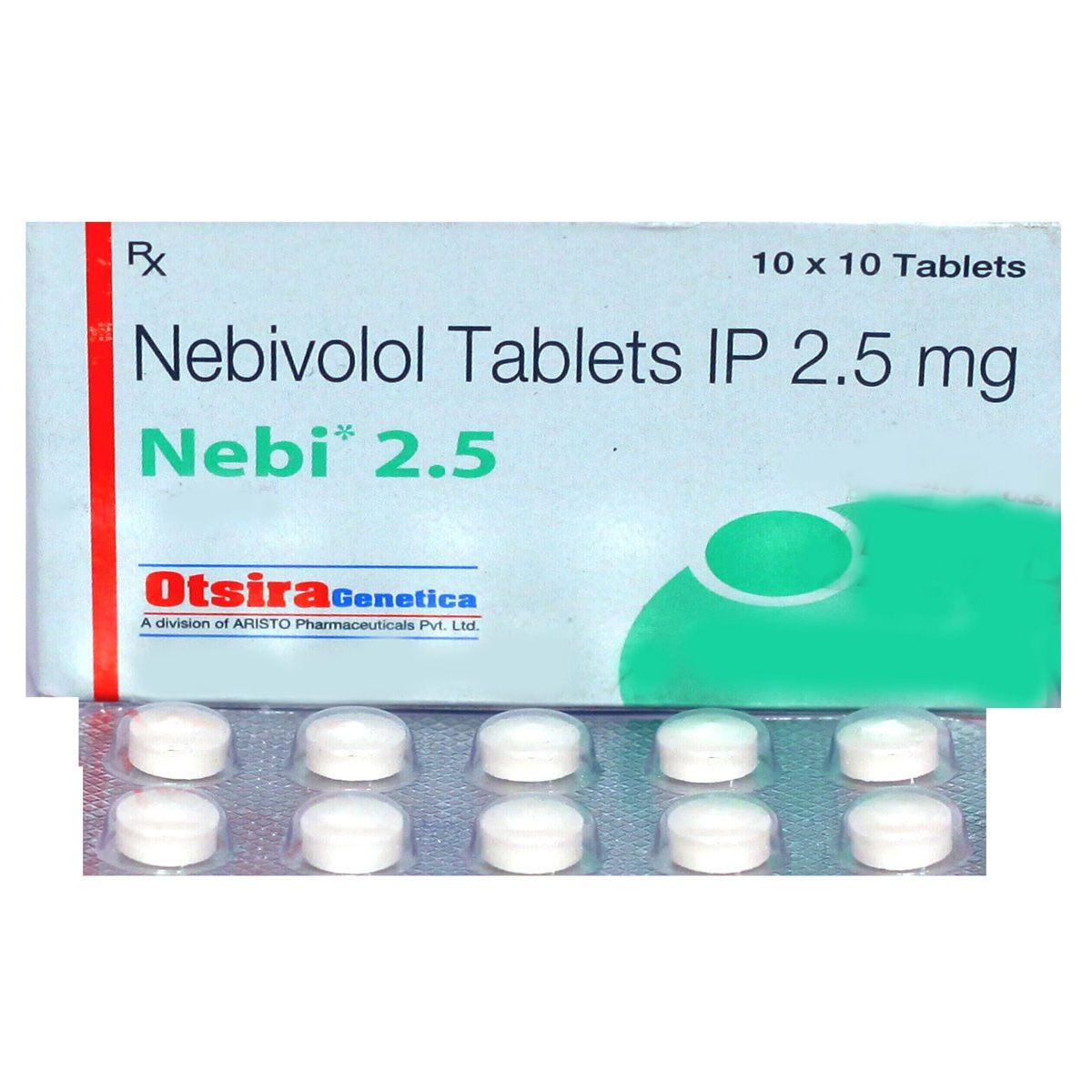Nebivolol
About Nebivolol
Nebivolol belongs to the group of medicines called 'beta-blockers' used to treat hypertension (high blood pressure). Nebivolol is also used to treat mild to moderate heart failure in patients aged 70 years and older in addition to other therapies. High blood pressure is a health condition in which the pressure in the blood vessels is high. The blood exerts elevated pressure on the walls of blood vessels, leading to hypertension. Heart failure occurs when the heart isn't able to pump sufficient blood to the remaining parts of the body.
Nebivolol contains 'Nebivolol' that relaxes and widens the blood vessels, making it easier for the heart to pump blood to all parts of the body. This helps in decreasing blood pressure and the risk of having a heart attack or stroke. Nebivolol helps in preventing increased heart rate and controls heart pumping strength.
You are advised to take Nebivolol for as long as your doctor has prescribed it for you, depending on your medical condition. In some cases, you may experience certain common side effects such as headache, nausea, dizziness, weakness, shortness of breath, low blood pressure, diarrhoea, unusual itching or tingling sensation, constipation, swollen feet, and hands. Most of these side effects do not require medical attention and will resolve gradually over time. However, you are recommended to talk to your doctor if you experience any of these side effects persistently.
Regular monitoring of blood pressure, electrolyte levels, and kidney functioning is advised while taking Nebivolol. You are advised to consume a low salt and low-fat diet while taking Nebivolol. Consult your doctor if you are pregnant or breastfeeding. Nebivolol is not recommended for children as efficacy and safety have not been established. Avoid alcohol consumption while taking Nebivolol as it might lower the blood pressure than normal. Keep your doctor informed about all the medicines you are taking and your health condition to rule out any unpleasant side effects.
Uses of Nebivolol
Medicinal Benefits
Nebivolol belongs to the group of medicines called 'beta-blockers' used to treat hypertension (high blood pressure). Additionally, Nebivolol also treats mild and moderate heart failure in patients aged 70 years and older in addition to other therapies. Nebivolol relaxes and widens the blood vessels making it easier for the heart to pump blood to all parts of the body. This helps in decreasing blood pressure and the risk of having a heart attack or stroke. Nebivolol helps in preventing increased heart rate and controls heart pumping strength. Continued usage of Nebivolol helps in decreasing the severity of heart failure, rate of hospitalization, and symptoms like shortness of breath and weakness. Nebivolol is used alone or in combination with other medicines to treat high blood pressure.
Directions for Use
Storage
Side Effects of Nebivolol
- Headache
- Nausea
- Dizziness
- Weakness
- Shortness of breath
- Low blood pressure
- Diarrhea
- Unusual itching or tingling sensation
- Constipation
- Swollen feet and hands
Drug Warnings
Do not skip any doses or stop taking Nebivolol without consulting your doctor. Avoid intake of Nebivolol if you are allergic to any of its contents. Talk to your doctor if you have heart, kidney, or liver problems, low blood pressure, serious circulation problems in the arms and legs, very slow heartbeat, serious heart rhythm problems, recent heart failure, asthma, liver function disorder, or metabolic disorder. Consult your doctor if you have or develop any of these conditions while taking Nebivolol like an abnormally slow heartbeat, Prinzmetal's variant angina - PVA (chest pain due to frequent occurring heart cramps), first-degree heart block (heart condition disorder that affects heart rhythm), poor circulation in arms and legs, prolonged breathing problems, diabetes, overactive thyroid, or allergy.
Drug Interactions
Drug-Drug Interactions: Nebivolol may interact with pain killers (aspirin, ibuprofen), diuretics (chlorthalidone, indapamide, furosemide, hydrochlorothiazide), anti-hypertensives (amlodipine, valsartan), PDE5 inhibitors (tadalafil, sildenafil), anxiolytics (alprazolam, diazepam), drugs used to treat heart problems (digoxin, epinephrine).
Drug-Food Interactions: Maintain low salt and low-fat diet while taking Nebivolol. Avoid alcohol consumption while taking Nebivolol as it might lower the blood pressure than normal. Avoid foods containing high cholesterol while taking Nebivolol.
Drug-Disease Interactions: Inform your doctor if you have diabetes, hypersensitivity, liver impairment, high cholesterol, hyperthyroidism, psoriasis, kidney impairment, asthma, heart problems such as bradyarrhythmia, cardiogenic shock, low blood pressure, fast heart rate, ischemic heart disease, or congestive heart failure.
Drug-Drug Interactions Checker List:
Safety Advice

Alcohol
unsafeYou are recommended to avoid alcohol consumption while taking Nebivolol to avoid unpleasant side-effects. Alcohol intake might cause increased dizziness and also might lower blood pressure than normal.

Pregnancy
cautionPlease consult your doctor if you have any concerns regarding this; your doctor will prescribe you Nebivolol only if the benefits outweigh the risks.

Breast Feeding
unsafeIt is not recommended to take Nebivolol while you are breastfeeding. Please consult your doctor if you have any concerns.

Driving
cautionNebivolol may cause dizziness and weakness, do not drive or operate heavy machinery if you feel dizzy.

Liver
cautionDose adjustment may be needed. Nebivolol should be used with caution in patients with liver impairment/liver disease. Please consult your doctor if you have a liver impairment or any concerns regarding this.

Kidney
cautionDose adjustment may be needed. Nebivolol should be used with caution in patients with kidney impairment/kidney disease. Please consult your doctor if you have kidney impairment or any concerns regarding this.

Children
unsafeNebivolol should not be used by children, as efficacy and safety have not been established.
Habit Forming
Diet & Lifestyle Advise
You are advised to consume low salt and low-fat diet while taking Nebivolol.
Regular exercise is also recommended to complement treatment with Nebivolol.
Eat a diet rich in whole grains, fruits and vegetables.
Avoid smoking and alcohol consumption.
Maintain a healthy weight with proper diet and exercise.
Managing stress with meditation, yoga, and massage would also help treat high blood pressure.
Special Advise
Regularly monitor blood pressure levels to prevent hypotension (low blood pressure).
Get up slowly while rising from lying or sitting position as Nebivolol may cause dizziness.
Your doctor may advise you to get a regular kidney function test and potassium levels in the body while taking Nebivolol.
Maintain a gap of two hours between Nebivolol and multivitamins and minerals as they might decrease the effects of Nebivolol.
Patients Concern
Disease/Condition Glossary
High blood pressure (hypertension): It is a condition in which the blood exerts increased pressure on the walls of blood vessels leading to hypertension. This condition can lead to hardened arteries (blood vessels), decreasing the blood and oxygen flow to the heart. Raised blood pressure can cause chest pain (angina) and heart attack (when blood supply to the heart is blocked). Additionally, high blood pressure also causes brain damage (stroke) and kidney failure. Symptoms of high blood pressure include headache, dizziness, nose bleed, changes in vision, chest pain, weakness and dyspnoea (shortness of breath). However, most of the time, the signs and symptoms of hypertension are none.
FAQs
Nebivolol is used to treat hypertension (high blood pressure). It is also used to treat mild to moderate heart failure in patients aged 70 years and older in addition to other therapies.
Nebivolol relaxes and widens the blood vessels making it easier for the heart to pump blood to all parts of the body. This helps in decreasing blood pressure and the risk of having a heart attack or stroke.
If you have diabetes, you should monitor your blood glucose levels often as Nebivolol might mask hypoglycemia symptoms (low glucose levels). However, please consult your doctor before taking Nebivolol if you have diabetes.
If you have hyperthyroidism (overactive thyroid), you should monitor your condition regularly as Nebivolol might mask hyperthyroidism symptoms such as abnormally fast heart rate. However, please consult your doctor before taking Nebivolol if you have hyperthyroidism.
Please do not stop taking Nebivolol without consulting your doctor as it may lead to a rise in blood pressure. Continue taking Nebivolol for as long as your doctor has prescribed it to you. Do not be reluctant to speak with your doctor if you experience any difficulty while taking Nebivolol.
Nebivolol may cause swelling of hands or feet. This could be due to oedema (fluid retention). Talk to your doctor if you think you have gained weight or have trouble breathing while taking Nebivolol.
Do not overdose on Nebivolol or any medicine, which could lead to very unpleasant side effects. Take Nebivolol only as prescribed by your doctor. An overdose of Nebivolol can cause a very slow heartbeat, low blood pressure, breathlessness, and acute heart failure. Rush to your nearest doctor as early as possible if you have overdosed on Nebivolol.
Follow a healthy diet and exercise regularly. Avoid smoking and alcohol consumption. Manage stress by doing meditation. Cut down on salt and saturated foods.
Nebivolol can be taken independently of meals. Take it at the same time daily or as advised by the doctor.
Yes, Nebivolol is a beta-blocker, a medicine that helps treat high blood pressure.
It takes 2 weeks to notice the full benefit of Nebivolol in blood pressure readings.
Taking Nebivolol with ibuprofen may lower the effect of Nebivolol in reducing blood pressure. Consult the doctor before taking ibuprofen with Nebivolol. The doctor may adjust the dose to safely use both medicines.
Nebivolol can be used safely in old-age patients if prescribed by the doctor.
No, Nebivolol does not cause weight gain. Maintain proper weight with healthy food and regular exercise. Consult the doctor if you notice weight gain as it could be due to other conditions.
Yes, Nebivolol is lipophilic in nature and can cross the blood-brain barrier.
Using beta-blockers like Nebivolol during the third trimester may increase the risk of neonatal hypotension, slow heart rate, low blood sugar, and respiratory depression. Therefore, Nebivolol should be used during pregnancy only if clearly needed.
Yes, Nebivolol may cause fatigue (tiredness). Do not drive or operate machinery until you know how the medicine affects you.
Side effects of Nebivolol include headache, nausea, dizziness, weakness, shortness of breath, low blood pressure, diarrhoea, unusual itching or tingling sensation, constipation, and swollen feet, and hands. Talk to your doctor if you experience any of these side effects persistently.









